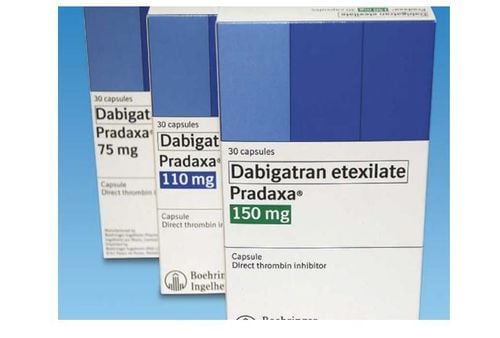This is an automatically translated article.
Article by Pharmacist, Master Nguyen Hoang Phuong Khanh - Clinical Pharmacist - Faculty of Pharmacy - Vinmec Central Park International General Hospital
Dabigatran is one of the new generation oral anticoagulants. To use Dabigatran drug safely and effectively, patients need to understand clearly about its uses, usage, adherence to treatment as well as monitor side effects under the guidance of doctors and pharmacists.
1. What is Dabigatran?
Dabigatra n, brand name Pradaxa® is one of the new generation oral anticoagulants. Compared with warfarin, the drug is equally effective and has a lower rate of bleeding, especially cerebral hemorrhage. New generation oral anticoagulants have a relatively wide therapeutic range, do not need frequent monitoring and testing to adjust the dose to ensure effects and limit side effects. In addition, the drug rarely interacts with other drugs and requires almost no dietary considerations like vitamin K antagonists.
Currently, new generation oral anticoagulants have been widely used. However, side effects are still well documented and in 2013-2014, dabigatran was in the top 10 leading to hospitalization for adverse events in older adults. In order to use drugs safely and effectively, patients need to understand clearly about the drug, how to use it, to adhere to treatment as well as monitor side effects under the guidance of doctors and pharmacists.
2. What does Dabigatran do? The effects of Dabigatran are listed as follows:
It is indicated for the prevention of stroke and embolism in patients with non-valvular atrial fibrillation (atrial fibrillation is a common arrhythmia). Treatment of deep vein thrombosis and pulmonary embolism. In addition, the drug is also used to prevent venous thrombosis in patients with hip replacement. However, a point worth noting when taking Pradaxa is that the drug should not be used to prevent thrombosis after the patient has undergone prosthetic valve replacement (mechanical or biological), LVAD, TAVR, because there are may cause some unwanted side effects. Therefore, if the patient has a history of previous prosthetic heart valve replacement, it is necessary to inform the treating doctor so that the drug can be selected safely and best for the patient.
3. How to take Dabigatran? To use Dabigatran safely and effectively, patients need to use it exactly as prescribed by the doctor, do not arbitrarily increase or decrease the dose or stop the drug without consulting the doctor. How to use Dabigatran as follows:
Dabigatran is a capsule and should be swallowed whole with plenty of water. In case you feel discomfort in the digestive tract, you can take the medicine immediately after eating. Do not crush or open the capsule as it will increase absorption into the body by 75%, increasing the risk of bleeding. Therefore, do not use the drug in case the patient is fed through a tube. In case the patient wants to change to another oral anticoagulant, it is necessary to contact the doctor. The drug should be taken at a fixed time of the day. If you forget to take your medicine within 6 hours, you can take 1 tablet and continue with the next dose. If it has been more than 6 hours, stop taking the missed dose, wait until your next dose, and take only 1 tablet. Do not take a double dose. Forgetting to take your medication increases your risk of blood clots, so make sure you always have a spare at home. Medicines easily lose their effectiveness if wet, so it is important to store the medicine in its original packaging, away from humid areas. Medicines without blisters should not be stored in the dispenser.

Thuốc Dabigatran, tên biệt dược Pradaxa® là một trong những thuốc chống đông máu đường uống thế hệ mới.
All anticoagulants increase the risk of bleeding. Bleeding symptoms can be mild or severe, for example:
Mild symptoms include signs of light bleeding and rapid stopping of bleeding, such as nosebleeds, bleeding gums (you should choose the type of brush you should choose). soft bristles for brushing), minor bruising under the skin. More severe symptoms that require you to contact your doctor: Pale skin, feeling very weak, fatigue, shortness of breath, chest pain ; vomiting blood or passing black, red stools with a fishy smell; prolonged bleeding during the menstrual cycle; all other bleedings that take a long time to stop;... To reduce the risk of bleeding, you need to limit contact with sharp tools such as sharp knives, razors. Limit activities that cause bleeding injuries such as climbing, running, jumping...
In case you forget to take your medicine for a long time, you are likely to have a blood clot or a stroke. Inform your doctor if you experience the following symptoms:
Lung signs: Chest pain, fast heartbeat, shortness of breath, fever. Signs in hands or feet: Sudden pain, swelling, heat, tightness. Signs of a stroke: Slurred speech, unable to speak, facial weakness, hemiplegia. In case you want to have surgery or have procedures related to bleeding such as tooth extraction, spinal intervention, it is necessary to inform the medical staff that you are taking anticoagulants so that the doctor can consider the treatment. Discontinue medication if necessary. Inform your doctor if you intend to become pregnant while taking this medication or are breast-feeding. 5. Food and drugs to avoid when using Dabigatran Some drugs can affect the concentration of Dabigatran such as Dronedarone, Ketoconazole, Rifampicin. Inform your doctor if you are taking these medications.
Antiplatelet drugs (aspirin, clopidogrel, ticagrelor...); non-steroid anti-inflammatory drugs (Ibuprofen, Diclofenac...); Antidepressants of the SSRI class have the potential to increase the risk of bleeding when patients take them. Therefore, it is advisable to consult your doctor before taking any other medication, including dietary supplements and herbal medicines. Limit the use of alcoholic beverages. You do not need frequent follow-up tests to check Dabigatran levels. Dabigatran is eliminated by the kidneys, you need to monitor your kidney function at least once a year. For patients with impaired renal function, more frequent monitoring is required to adjust the dose. In summary, Dabigatran is one of the new generation oral anticoagulants. Compared with warfarin, the drug is equally effective and has a lower bleeding rate, especially cerebral hemorrhage. To use the drug effectively, safely and limit serious side effects, patients need to use it exactly as prescribed by the doctor or pharmacist.
Please dial HOTLINE for more information or register for an appointment HERE. Download MyVinmec app to make appointments faster and to manage your bookings easily.
References:Dabigatran package insert Uptodate 2021 Dabigatran/Patient and family information/Thrombosis Canada Dabigatran/Mayo Clinic Dabigatran/Patient and family instructions/Massachusetts general hospital













